James Pecore
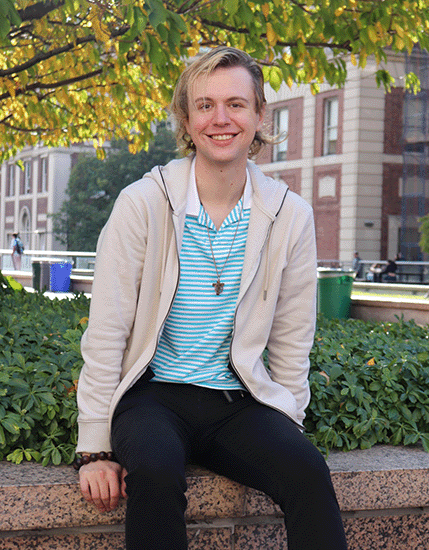
A composer-performer based in Manhattan, James Pecore, 22, interweaves disparate traditions and theologies—both religious and queer, popular and avant-garde—throughout his work. He is the 2022 composer in residence with Inštitut .abeceda, a Slovenian ensemble for new music based in Ljubljana, and currently studies composition at Columbia University.
“I will write music until the day I die,” says James, an enthusiast. His vocal career started at age 6 as a countertenor or “boy soprano,” an uncomfortable experience. Discomfort inspired his personal anthem, “Never be ashamed of who you are.”
He actively composes works for orchestra, jazz ensemble, chamber ensemble, chorus, opera, and musical theater. He wrote ("in between") about binaries in music – contemporary and medieval, tonic and dominant – and in life for the New York Youth Symphony under the direction of Michael Repper and Matteo Paoli, and The Little Merman for the New York Youth Symphony Wind Orchestra. He also created a percussion work, Mirror Neurons for the highScore Festival and a solo oboe piece,_ Placid Lake_, for soundScapes Festival, both in Italy. He was a recipient of the 2018 Robert Scandrett Memorial Award for his arrangement of The Battle of Jericho, and his commission, Wintergale for Oregon Symphony associate concertmaster Peter Frajola was dedicated to those who died in the West Coast fires that summer.
James says, “I can’t wait to work with more passionate, expressive performers to make something beautiful, rebellious, and unique.”
Listen to Knit Inside Me for solo harp written by James in 2020.
Diego Berrospi Gutierrez
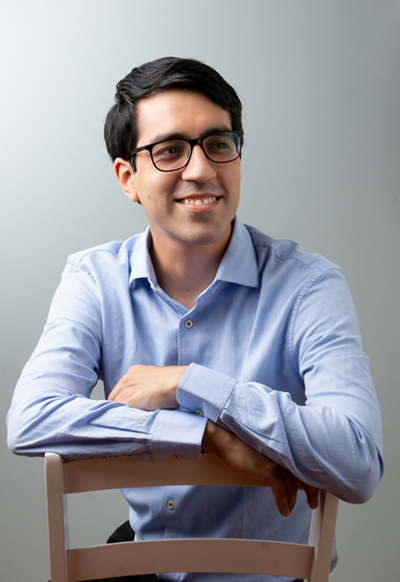
Incan history and the breakneck pace of globalization have inspired 28-year-old emerging composer Diego Berrospi Gutierrez from Peru. Diego extols the jungles, mountains, Spanish invaders, traditional gods, and ancient stories as a wellspring for his work. And yet, he says, “I am a citizen of the world … (who) can talk about life in Lima today or (in) the universe.”
He won national prizes for_ Zúmac Ñusta_, a choral work premiered by the National Choir of Peru, and Pacífico, a string trio performed in Gran Teatro Nacional in Lima; and a premiere and broadcast by Radio Universidad FM 107.5 of “Time, Devouring Time,” for soprano and piano.
While being a contemporary classical music composer in Peru is not yet a common career path, Diego has begun paving the way for other composers as a co-founder of the Sinapsis collective, promoting contemporary music concerts, and as a member of the Laptop Ensemble at the National University. He believes his music is the manifestation of his historical, social, and human moment, and that’s why he will continue to “walk through the world to create”.
Listen to Diego’s Zumac Ñusta for mixed choir (Beautiful Maiden)
Mieke Doezema
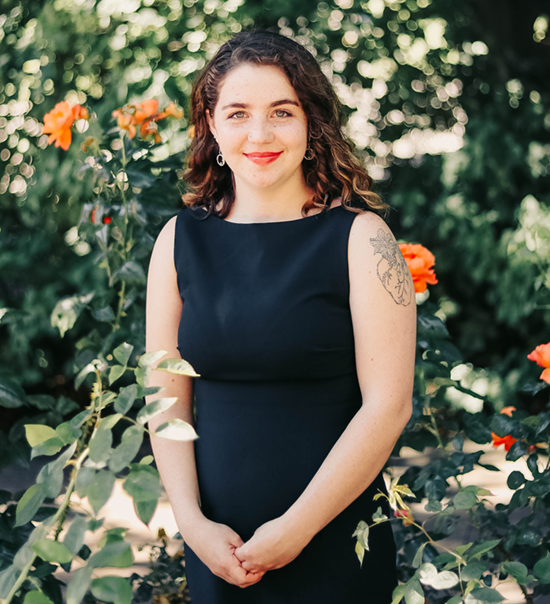
The dual roots of Mieke Doezema’s raw and poignant music are New Mexico’s high desert and her work as an advocate for domestic violence and sexual assault survivors in Washington state, where she studied cello performance and composition. In 2019, Mieke premiered an evening of electro-acoustical and large ensemble compositions including Drunk Masculinity, Evolution to Equilibrium, Forget Me Not, and Unwelcome.
“My proudest moment as an artist was the premiere of my piece, Unwelcome,” Mieke says. “I wrote the violin solo with wind symphony for a colleague, friend, and trauma survivor to tell her story for the first time. That night showed me the power of art and music to give a voice to those who have been silenced and to tell stories that need to be heard.”
Mieke, 24, volunteered at Domestic Violence and Sexual Assault Services, where she received more than 50 hours of training and helped those traumatized by violence connect with critical community resources. Her experiences have inevitably enriched the poignancy and complexity of her art. As she tells the stories of others through music, she also examines who she is. Mieke has come closest to manifesting her authentic self in I Carry the Weight of Memories, a piece for solo piano.
Mieke won first place in the Western Washington Composers Competition, and Symphony Tacoma premiered her work Godless Galisteo on YouTube last year. Like many other works, Covid delayed or moved online first performances of her compositions, including Anthropocene: A Lament to Earth; Monsoon Season for solo marimba; and Reverie & Petrichor for music box and piano.
Listen to Mieke’s I Carry the Weight of Memories for solo piano.
Sophie Fay
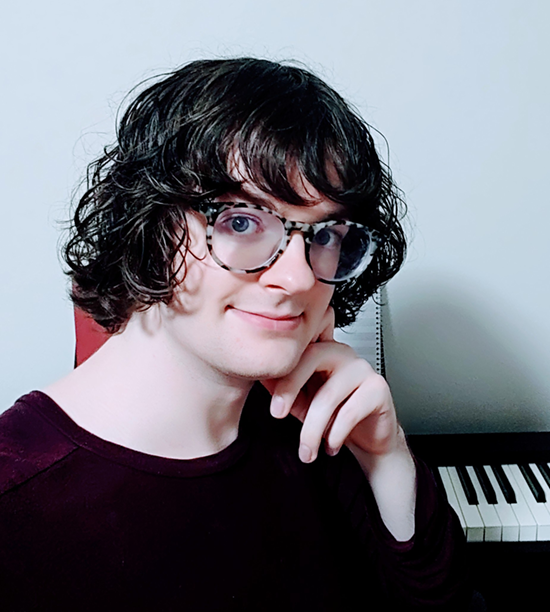
An encyclopedia of music, 22-year-old composer Sophie Fay discovered her passion in a high school orchestra class where she was handed a score of Leonard Bernstein’s Candide Overture. Later, she became one of only two artists accepted to Central Washington University’s Composition Studio. Sophie came out as transgender in 2018, and she is meeting the challenge of transitioning with music. Her moving work_ Fantasia and Fugue_ for solo piano was featured among a group of LGBTQ+ composers who created new works during Pride Month 2021.
“I feel a need to fight back against bigotry in any way I can, and I’ve found,” Sophie says, “my voice in this battle lies in the power of art.”
Sophie’s horizons as a musician have been broadened by her life experiences: she discovered and immersed herself with a group of underground, low-income, transgender musicians who introduced her to abrasive noise music and the calming sounds of drone music. She works from the conviction that music should not be bound by style, media, or sound design.
Sophie’s published works include video game scores. “I look up to composers like Hitoshi Sakimoto and Motoaki Takenouchi,” says Sophie. “(Their) excellent video game soundtracks … have redefined the possibilities for colors in music, with exquisite bell tones and smooth modular functions.”
Listen to Sophie’s Fantasia and Fuge for solo piano.
Jonathan Wu
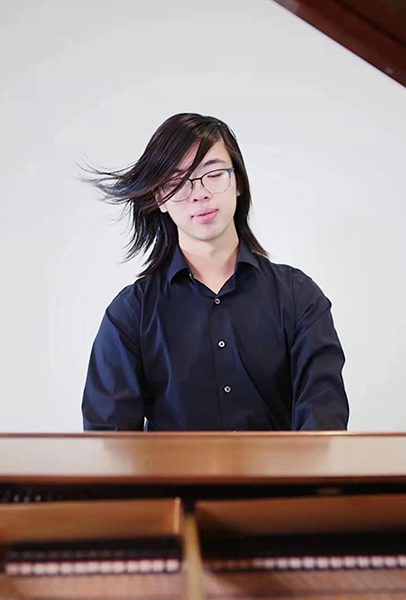
The youngest composer, Jonathan Wu, age 17, jokingly describes his charm to be “kind of all over the place.”
His devotion to writing music is anything but. Born in Shanghai, China, he moved with his family to Minnesota at the age of 12. Just a year ago Wu finished his composition, First Snowdrop for Solo Violin. It was premiered and recorded by violinist Tien-Hsin Cindy Wu, director of the Emerging Composers Intensive. The performance received rave reviews. Every musician and audience member was awed that this work was Jonathan’s Opus One. He described the experience to be “nothing short of a miracle.” His success convinced him to pursue a career in composition.
Jonathan dreams of writing a full-length orchestral work. Jonathan began studying the piano at age 4. The vast repertoire and brilliant virtuosity of the instrument continue to be a rich source of inspiration for his writing. In addition to music, Jonathan is an avid tennis fan who owns a large pink fluffy tennis ball signed by three of tennis’s top stars.
Listen to Jonathan’s First Snowdrop for solo violin.
Kian Ravaei
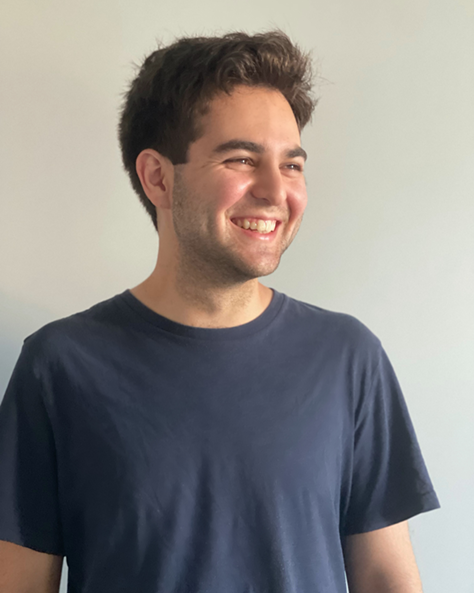
During the pandemic, Kian Ravaei’s daily ritual was playing a chorale by J.S. Bach at the piano and then composing an original chorale. Three hundred seventy-one chorales later, Ravaei has cultivated a deeply personal harmonic language and an obsession with the art of counterpoint. Like Bach’s chorales, many of Ravaei’s works appear to be simple on the surface, but underneath they are rich and filled with unexpected nuance.
Born in 1999 of Iranian immigrants, Ravaei spent his childhood playing jazz, producing electronic dance music, and singing in a rock band when he should have been practicing piano sonatas. His diverse output has included a book of piano preludes inspired by mythical creatures, a string quartet that synthesizes Western and Persian classical music, and an orchestration for dubstep DJ and producer Wooli.
Ravaei’s music has been performed by leading musicians such as interdisciplinary artist Anoush Moazzeni of the Iranian Female Composers Association, guitarist JIJI, and pianists Stefano Greco and Jihye Chang. He has been commissioned by notable organizations and ensembles such as the Canadian Music Centre and Salastina.
As of the 2021/22 season, Ravaei is a newly appointed Composer Teaching Artist Fellow with the Los Angeles Chamber Orchestra. He makes his home in Los Angeles, where he studies music composition with Richard Danielpour — one of his favorite living composers — at the UCLA Herb Alpert School
Listen to Kians’s Family Photos for string quartet.
Alexa Letourneau
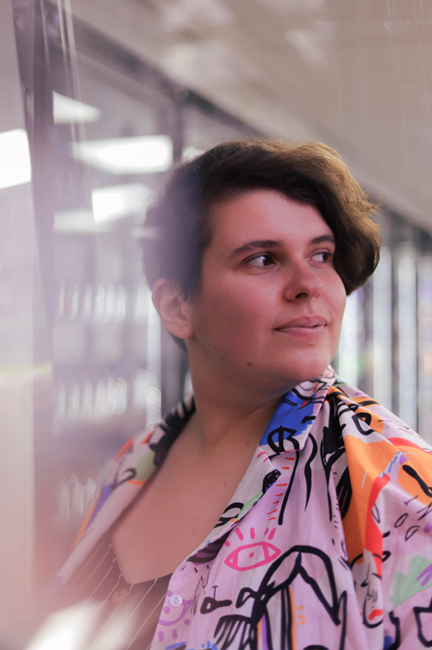
Within weeks of starting flute lessons at age 9, Alexa Letourneau began taping five pens together to draw a staff and write music. Now, listeners from Austria and Bulgaria to South Africa and Australia have heard her work. Also a flutist and vocalist, Alexa focuses on the bookends of classical music: the work of living composers and early music, especially German vocal music written prior to 1750.
Alexa is a speaker for gun violence prevention and an activist for LGBTQ+ musicians. Her social justice commitments have informed the sound stories she has composed, including _Coming Out, Reflections on Life in the Close_t and Requiem, a mass for her father. According to renowned Austrian composer Gabriele Proy, Alexa’s use of unique timbral combinations creates an expressive sound that is "poignant and intriguing, yet whimsical.”
"quiddities," a piece Alexa premiered in 2020, explored her personal experiences in quarantine both as someone who survived Covid and as a musician working to remain collaborative despite the distance. And, of all the awards her compositions have won, she was most delighted for becoming the fan-favorite during a 48-hour compositional challenge with her piece "Piccolo piccolo Piccolo piccolo piccolo piccolo Piccolo piccolo.”
Alexa is the founder and host of the new music podcast Classical Schmassical: the anti-Classical classical music podcast.
Listen to Alexas’s Lamellae for guitar and violin.
Cixian Lu
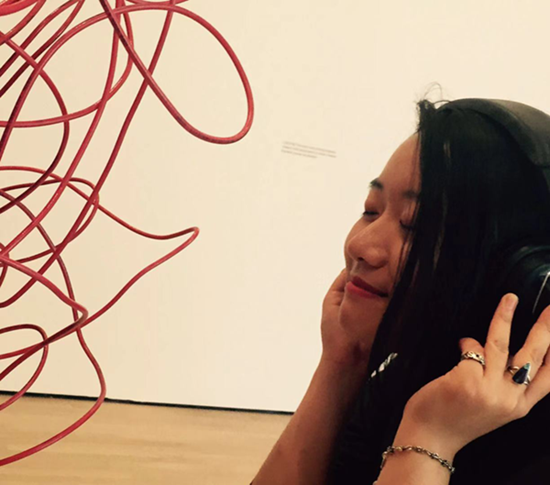
Cixian Lu, 31, has embodied the extreme edges of Chinese classical music and culture. Her piano studies began at age 3; she debuted as a Chinese Kun Opera soprano at 12; and she premiered a techno-chamber piece for vocals and piano in Sanskrit at 24. Sacenme Subhute, incorporated chanted Buddhist scriptures, a Chinese Kun soprano, and piano with accordion and electronic sounds approximating water. The piece was a meditation on the question, “Why so?”
More recently, her Shanghai Soundscape and Sound Sculptor multimedia art installations showcased her commitment to offering listeners new ways to hear life’s stories. Through spoken word, electro-acoustic music, and traditional Chinese and European classical instruments, Cixian explores ephemera -- smoke, mists, seasons, emotions, mistakes, cultures, and love.
Dark comedy enters Cixian’s work more than once. A slightly vicious, thoroughly amusing piece of contemporary fiction by Courtney Sender, What to do with the Pain in Your Chest, formed the basis for a work of the same name that premiered on Fresh Squeezed Opera, and Peter Smyth’s colorful comic strip To Never Speak Again provided the text for her eponymous chamber work. In More Than a Number, a multimedia presentation, premiered at the Atlantic Center for the Arts in Florida, Cixian used piano music, poetry, electronic sounds, video, and the shuffling of tiles and bingo markers to explore wanting to be more than “Number Three daughter of Number Two son.”
Listen to Cixian’s Stella Dance for orchestra.